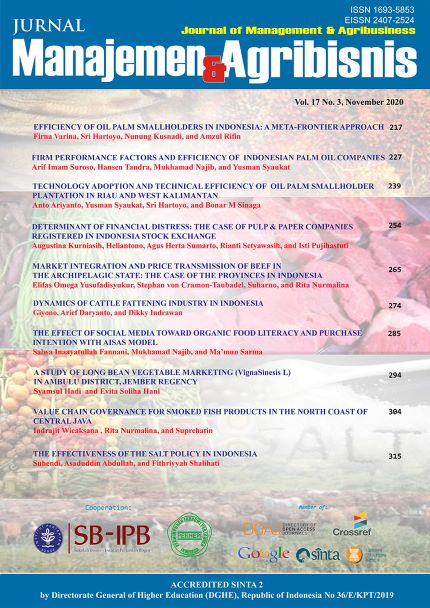Abstract
In general, the goal of a policy is to achieve public welfare through regulations made by the government. Regulations are generally made because they are required to regulate the interests of the communities. Salt is an important commodity demanded by the people in Indonesia. In adition, Indonesia is a country with the second longest coastline in the world; therefore, it has a potential to produce salt and achieve self-sufficiency. However, the national salt production has not been able to meet the demand for salt, especially in meeting the needs for industrial salt. To overcome this problem, the government issued a policy of procuring salt through imports with the hope that industrial needs are met and simultaneously domestic salt production can be increased. The objective of this paper is to analyze the effectiveness of the government policies related to salt by adopting the Regulatory Impact Analysis (RIA) approach. Data and information were obtained through focus group discussions with relevant stakeholders and literature studies analyzed using the RIA approach. The results of this study concluded that the salt policies in Indonesia, especially related to the policy of salt imports, has not been effective. Strategies and corrective actions must be taken so that they can be optimally effective. Strategies that can be carried out include improving the import salt trade system through strengthening the data collection system, monitoring the running of local salt businesses and enforcing laws. The combination between improving the quality of salt produced by the local farmers and guaranteeing the salt prices at the farmer level will accelerate the achievement of the policy objectives.
Keywords: self-sufficiency, public policy, imports, farmers, regulatory impact analysis
Authors
Authors who publish with this journal agree to the following terms:
- Authors retain copyright and grant the journal right of first publication with the work simultaneously licensed under a Creative Commons Attribution License that allows others to share the work with an acknowledgement of the work's authorship and initial publication in this journal.
- Authors are able to enter into separate, additional contractual arrangements for the non-exclusive distribution of the journal's published version of the work (e.g., post it to an institutional repository or publish it in a book), with an acknowledgement of its initial publication in this journal.
- Authors are permitted and encouraged to post their work online (e.g., in institutional repositories or on their website) prior to and during the submission process, as it can lead to productive exchanges, as well as earlier and greater citation of published work (See The Effect of Open Access).

